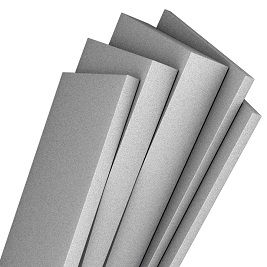TENAPORS NEO EPS 150
TENAPORS NEO EPS 150 is a polystyrene foam with exceptional load durability and, therefore, it is used for thermal insulation of various load-bearing structures. The material contains a graphite particle which, in comparison with a standard EPS material, improves its thermal technical indicators by about 20%. Most commonly the material is used for thermal insulation of roofs and foundations.
TENAPORS NEO EPS MAIN ADVANTAGES
- The physical and mechanical properties of the foamed polystyrene material largely depend on its volume mass. With the higher volume mass, values of the strength parameters also increase, such as compressive, flexural and shear strength, which also determines the usage of the material
- The good insulating properties of the foamed polystyrene material arise from the high content of air pores. The foamed polystyrene material is made of approximately 98% air and 2% polystyrene. The efficiency of thermal insulation materials is characterized by thermal conductivity coefficient “lambda” λ (W/mK), which is one of the lowest in foamed polystyrene materials (in particular in TENAPORS NEO) and ensures the lowest level of heat loss.
- Polystyrene – the formative element of the foamed polystyrene is not a hygroscopic material, and even in direct contact with water it absorbs only a tiny amount of water! Since pore walls are waterproof, the water can merely run through the material or penetrate inside only through the channels between the pores
- Foamed polystyrene sheets TENAPORS NEO are UV light resistant
- They may be continuously used as a thermal insulation material at ambient temperatures of up to + 80°C.
- Foamed polystyrene does not rot, does not serve as a medium for bacteria and is eco-friendly. It is resistant to weak acidic, alkaline and saline solutions but non-resistant to aromatic and halogen containing solvents, esters, ketones, oils or lubricants
Solutions
Declarations
Technical data
Characteristics Nominal value Fire reaction class E class Sizes 1000×500* mm Thermal conductivity coefficient ≤0,031 W/m*K Compression tensions ≥40,9 kPa Tensile strength ≥150 kPa Long-term water absorption ≤3,5% Insulation thickness Upon request


